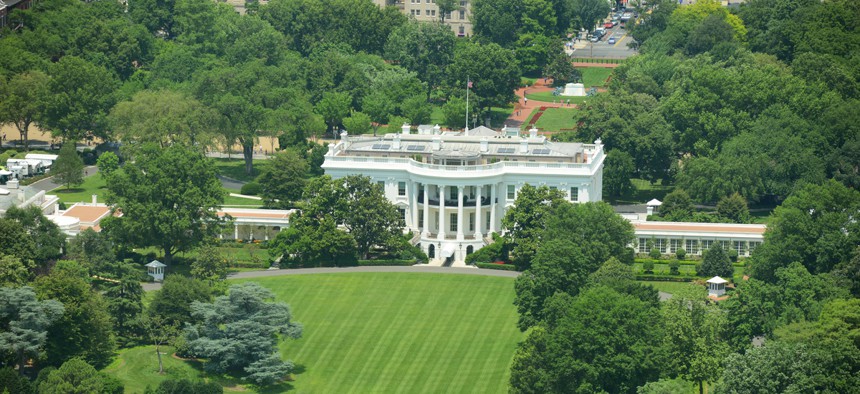
jiawangkun/Shutterstock.com
Rewriting the Rules of Presidential Succession
A project begun after 9/11 assumes new urgency after the 2016 election—creating a more sensible plan for what happens when a chief executive steps aside.
American politics is deep into the theater of the absurd—but unfortunately, it is a deadly absurdity, like being in a horror funhouse where the creatures leaping out at you have real knives and chainsaws. Americans now have to face at least the possibility, a tangible one, that the election itself was subverted by a hostile foreign power in league with the winning presidential campaign, with implications all the way down the ballot.
What to do if that proves to be the case? It is a question I have been asked a lot; my stock answer begins with, “The Constitution does not have a do-over clause.” But I am now rethinking the response: Maybe it needs a do-over clause. And it does not have to require a constitutional amendment.
From the day after the 9/11 catastrophe, I threw myself into creating a set of safety nets for the constitutional system, ensuring that the United States would have a rapid, orderly, and legitimate set of ways to ensure the continuity of government in the event of a terror attack that could decapitate one or more of its three branches. It started with Congress, and the need to have emergency interim appointments if an attack dropped either or both of its houses below the constitutionally mandated quorum of half the membership to do any business, until reasonable, deliberative elections could be held to fill vacancies.
But the Continuity of Government Commission that Tom Mann and I worked to create also focused on presidential succession. Unlike Congress, this did not require a constitutional amendment, but could be done legislatively. It was clear to us that there were real problems in the Presidential Succession Act of 1947. It was enacted at the urging of President Harry Truman, when, in the dangerous environment just after the war, he traveled with his Secretary of State Edward Stettinius, then next in line for the presidency, to Potsdam and realized the system’s vulnerability.
Here is what the Constitution says about presidential succession:
The Congress may by law provide for the case of removal, death, resignation or inability, both of the President and Vice President, declaring what officer shall then act as President, and such officer shall act accordingly, until the disability be removed, or a President shall be elected.
Congress accepted Truman’s recommendation to return the leaders in Congress to the line after the Vice President, starting with the speaker of the House and then the president pro tem of the Senate (an earlier succession plan from 1792 had included first the Senate leader followed by the speaker; when revised in 1886, congressional leaders were dropped.) They were then followed by Cabinet members in order of the creation of their offices.
The 1947 Act was flawed in many respects, starting with the dubious constitutionality of having congressional leaders in the line of succession (they are not “Officers” of the United States, as the Constitution requires) not to mention their inherent conflicts, including their role in impeachment of the president. But it was also the case that everyone in the line resided in Washington, creating a vulnerability in the modern age of small but potent nuclear and other weapons that Truman and his allies could not have foreseen. At the same time, having all Cabinet members in the line—many of whom were not chosen because of their breadth of policy expertise or qualifications to step in as commander in chief—was not wise.
So the Commission recommended streamlining the line of succession, dropping lower-level Cabinet members, and adding a new category of people deputized as Officers, chosen by the president to be confirmed in the posts by the Senate, representing geographical breadth and presumably policy and even political depth.
Unfortunately, that reasoned and reasonable suggestion went nowhere (along with all the other recommendations of our Continuity of Government Commission; once the immediate threat faded, Congress had no interest in looking ahead and building in some insurance for the future.) That is more than unfortunate; it is potentially tragic, since the threat is even greater now. Those issues can and should be revisited. But in particular it is now time to revive the dormant interest in, and importance of, presidential succession to take the new nightmare into account.
Here is the big problem. What if the election was effectively stolen? Under the current presidential succession structure, if Donald Trump were impeached and removed from office, Mike Pence would replace him. But if the election had been stolen, Pence’s place as president would be no more legitimate than that of Trump. After Pence—Paul Ryan, the speaker, followed by Orrin Hatch, the president pro tem, followed by Secretary of State Rex Tillerson. If voters’ collective desires were subverted by foreign interference and a party’s collusion, none would have a legitimate claim—especially since the control of the Senate, at least, would have been affected by the Russian role.
The Constitution leaves a lot of leeway for Congress. So it is time to consider a new law, one that cleans up the issues and discrepancies in the existing succession act but does more. It should allow for a special election for president and vice president under extraordinary circumstances. Those could include a terrorist attack or an attack by a foreign power or others on Election Day or on the election system or process that destroys or distorts the results. It can also include foreign interference in the election combined with a winning party’s involvement in or reinforcement of the interference. Such a provision would have to be carefully drawn and set a high bar, to avoid any chicanery to call an election for the wrong reasons. It would probably have to require a two-thirds vote in both houses of Congress.
Of course, realistically, no do-over option will or could happen to deal with the current ungodly mess. It may well be that the Trump campaign’s role has been exaggerated by its critics; there is not yet any public evidence of collusion. But if the worst case proves to be true, America will have to live with the consequences, including the dark cloud of illegitimacy that would hang over all actions taken by an administration that won with the aid of foreign interference. The evidence that is already public makes it clear that malign foreign forces have tried, and will try again to influence, distort and even swing American elections. That’s why Americans need to begin serious work and debate toward crafting a reasonable option so that this Friday the 13th doesn’t turn into a series, and so that Americans finally give themselves some protection against the kind of nightmares that modern cyberwarfare and terrorism can allow.







